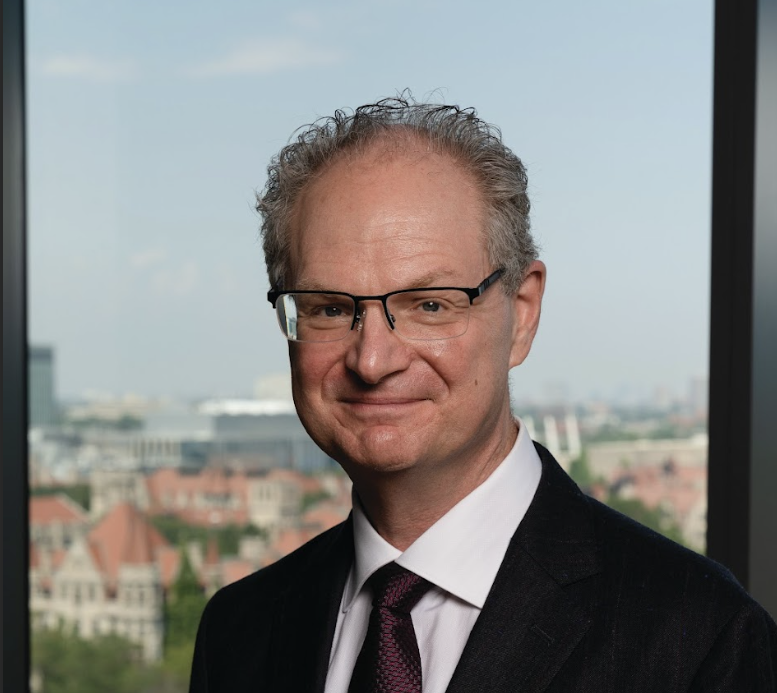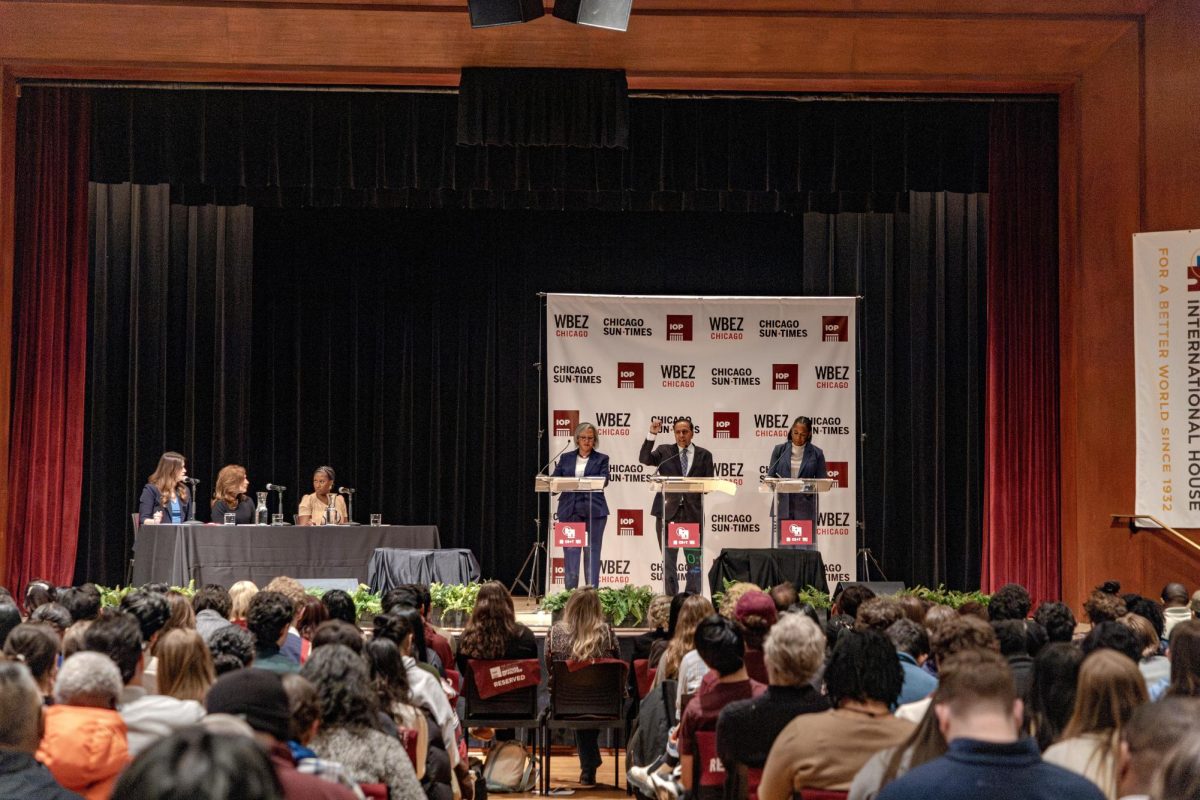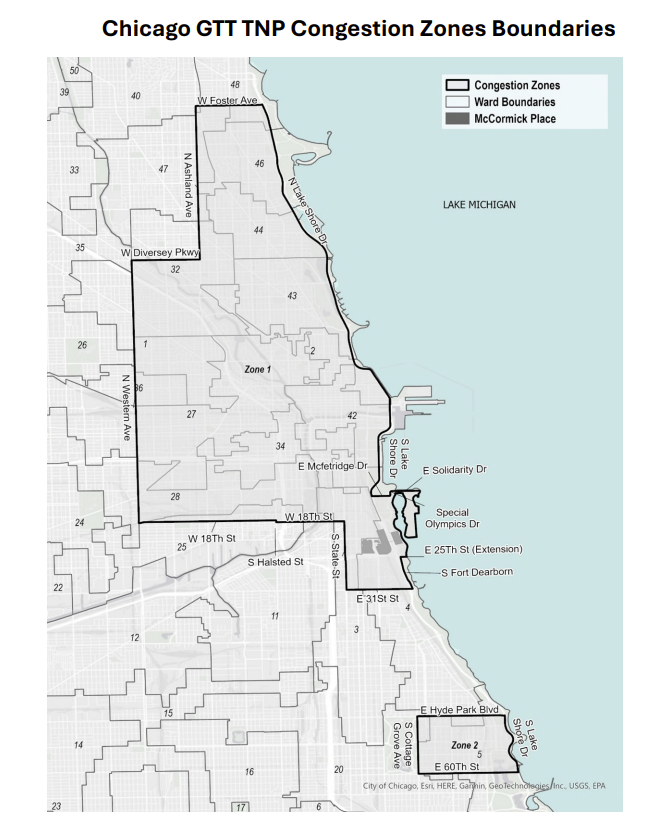In his third year as president of the University, Paul Alivisatos has become the anchor of an administrative cabinet that has seen substantial turnover in the past year.
In an exclusive interview on October 25, Senior News Reporter Naina Purushothaman spoke to Alivisatos about the Hong Kong campus, safety and security, free expression, and the University’s relationship with the Hyde Park community.
Chicago Maroon: With American businesses increasingly leaving Hong Kong, what is the status of the Hong Kong campus?
Paul Alivisatos: It was quiet during the pandemic. So, as you may know, in China and in Hong Kong as well, the restrictions on travel were very intense. All the remote work and so on were there.
So actually, the campus ended up being closed for three years, and during that period, we ended up hosting one set of our activities in Singapore for one year. But in June of this past year, we did essentially reopen there, and there are some programs running there now.
As you point out, it’s a complicated environment. There’s been a lot of changes. What’s the national security law with the overall global environment there? I say right now, there are faculty teaching there; there are some programs. Those programs seem to be going well. And within the classrooms, we’re going to see how things go. But it seems to me like what I’m hearing is that faculty are feeling that they’re able to have the kinds of substantive Chicago-like classes that they would like to see.
Let me share a perspective on this. I do think it’s true that there’s a lot of forces pulling. There’s a real set of geopolitical forces that are pulling apart. And it’s also an interesting question: Are there some areas of creation of new knowledge which might create the kinds of connection points which over time…will be the pieces that still connect these different societies which are so large, which are so impactful on the world, where there may be many topics where research together [and] teaching together might benefit the world?
So I think we should be careful and thoughtful. We have a campus there. It’s being used right now. It can serve functions of connection points even in a world that’s pulling apart. Let’s be thoughtful and careful and see how the campus goes over time.
CM: The University has lowered the number of monthly Lyft rides around campus. What went behind that decision, and do you anticipate that that will change in light of the recent safety concerns on campus?
PA: Let me say, I do think that the first thing that was described a little bit yesterday, in the [safety] webinar actually, the Lyft ride emerged originally as something that students proposed that we adopted, not so much in the context of security. But in the end, it turns out that it makes a lot of sense. I do believe that having a point-to-point transportation option that students can use when needed is a really good thing to do, and also, having a healthy shuttle service is a good thing to do.
And I will say that the initial version, you know, we started with a certain number and tried it out, there was some reasonable data that showed that there were a number of Lyft rides that were being used, essentially, in times and places that were substitutional to the shuttle services. And so that’s an example of having a harm to the public good because the shuttles are important, because they provide a way that’s appropriate for getting people around that doesn’t use [individual cars] and it doesn’t clog the street. They’re just a better way of doing things at some level.
So certainly one of the factors in our mind was that making it so that you have to ration it just a little bit more would help to make sure that the balance between the common service of the shuttles versus the point-to-point choice—that one wasn’t harming the other—was part of the logic that went into making the shift.
We’ve only had this seven [Lyft rides] in place for a short time. I’d like to see what the data looks like for a little bit. And then we’re also going to look carefully at if there are other options. We’re going to look at those things, too. And I think getting the feedback is always helpful. One thing I do want to say about the [safety] webinar is that there was a lot of feedback that came to us, and we’ll continue to go through all the comments and just reflect on them and try to see other things from that that we should pull out.
CM: Have the safety concerns begun to harm the University’s ability to attract undergraduates, graduates, or faculty?
PA: Not that I’ve seen. In fact, the early numbers all look very encouraging to us in terms of all the factors that we would look at in terms of applications and how they come in and so on. But this was a terrible, terrible set of incidents that really affects the community.
I do want to also reiterate a little bit of what I said yesterday in the webinar. We’ve been making a series of investments that we’re continuing over time. I do want to note that, because of the investments we made in the cameras, the license plate readers, especially also in the creation of [the] Strategic Operations Center, which is a group within the UCPD that’s looking at all of that data and helping us to deploy our forces in response to what’s happening, we were able to actually make the arrest that we made. And I think that’s important. But it’s very concerning.
One other thing I do want to say is there’s the shuttles, there’s the Lyfts, there’s ways to request a walk, there’s a number of things that people can do that help them manage the safety situation. It’s a very difficult thing to do, and I urge students and families to look together at all of those tools which are available. We do want people to experience the wonderful parts of the city, of which there’s so many, so I think it’s important to try to really have a conversation about approaches to the safety situation. But you’re also thinking about how to have the joy of the city as well as to manage to the best comfort level and decisions about how to use the various tools to manage it as safely as possible. I think that was Dean Rasmussen’s message, which I liked a lot.
CM: Another issue has been maintaining an inclusive campus versus fostering free speech. We wanted to ask, in light of the protests on campus, have any donors or trustees pushed the University to bar or disband SJP?
PA: Let me just [say] a couple of things here. So first is no to that question. Let’s talk about what it is that leads to a university that fulfills its highest aspirations, which is to be a place of truth seeking. The original statement of inclusion versus free speech is kind of not the way I would view it. I think that actually, in the best version of free expression, free expression is happening in an environment where students and where community members are learning to respectfully listen to others, to have compassion towards human beings, to be wanting to learn from others what their ideas are and so on.
And the best version of free expression is by hearing somebody else’s viewpoint who maybe has had different experiences. That’s the potential of a moment of truly learning and sharing with others. So I think those two—free expression and inclusion—we should be viewing those as reinforcing each other, not being in tension.
Now, I will say obviously that’s an example that I’m giving where free expression is working in the best way. If students want to read something on free expression that I thought was quite beautiful, it would be professor Gabriel Lear of the 2018 Aims of Education address, which talks about how to [engage] in free expression in the University in a virtuous way. She’s not worried, and I love that.
But obviously, we know that when there are important, deep, difficult topics going on, not every interaction is one that’s as respectful or as compassionate as what I’m describing. I would urge students or others who are reading The Maroon just to take a step back and reflect on that. I mean, going back to [Core classes] and thinking, what did this course teach us about how to be human in this world? Let’s go back and not lose those things.
So there’s a lot to talk about around the topic of free expression right now. It’s a very, very, very difficult time. There’s a lot of very difficult things happening in the world. Horrible things. So I just want to go back to that, and we could talk about all the specifics, but at some level, we each are in this world as part of a community, and we do things to make it better or worse. And so each person, I hope, will reflect on that.
CM: Going off of that, do you think the Kalven Report needs to be updated to address an individual’s ability to direct supporters, especially online, to harass those whom they disagree with?
PA: The Kalven Report is struggling with the issue of whether the University takes positions in the world for issues that are not inside the University. The report specifically says—I think more or less correctly—that because as a university, we believe that evidence and reason and logic and rigor…should be the [approaches] that guide us as opposed to authority or tradition or dogma.
The report says, I think relatively correctly, if, for example, the institution, possibly in the person of the president…starts to take positions and does so over and over again, then that is in the sense of authority, saying to people in the University, this is how you should think. And so the Kalven Report says: Future presidents, don’t do that. So that’s what the Kalven Report says.
Now, your topic, your question about the online components, has to do with whether there can be various ways in which individuals inside the University may potentially thwart the free expression of others. And then we have various ways of handling that, disciplinary and otherwise. This particular topic that you raise is a very complicated one. Certainly, it’s true that if a person specifically directs in that way, that that probably would run afoul of some of the existing disciplinary policies, but it can be quite complicated because [there are] specifics that can go into a situation like that that have to be looked at carefully.
It’s a very difficult situation right now because these online tools can create environments where people do feel like their expression is being thwarted but where in some sense, there hasn’t been a direct action that leads to that, so it’s complicated.
I will say this: If somebody is experiencing people harassing them online, we have a lot of tools for supporting people in that situation. And last year, actually, we spent a lot of time looking at those and enhancing them. So I do want to say out front that we do have a lot of support for such a situation and that if there is a situation where somebody appears to have used those online tools to thwart another person, certainly, if we receive a complaint, we have disciplinary policies that let us look at those situations. It’s just they’re not always going to work in a simple way. They have to fit within certain criteria. I hope that’s enough to be clear. It’s complicated.
CM: We also wanted to talk a little bit about Hyde Park and the University’s relations with Hyde Park. How often do you speak with community leaders in Hyde Park?
PA: I do end up meeting quite a lot because I’m out and about, and I meet them at different events and so on. But let me say that the partnership of the University with nearby communities, Hyde Park, and also Woodlawn, Washington Park, and so on, those matter a lot to the University, to being a good partner together, to trying to think about things in interesting ways.
I want to give you an example from my very recent one. So [at] the cancer center groundbreaking [ceremony], I just found one of the most moving things because there was a large contingent of people from the community who were celebrating with us what this would mean for people all across the South Side who are now going to have, ultimately, a set of cancer-related programs that will help save lives. It will also be really in partnership with the community.
If you get a chance, you could go and see a little bit of the video of the statements. It’s about one hour. You know, there’s some beautiful choir singing, there’s some wonderful statements. The attorney general, Kwame [Raoul], spoke with one of the most powerful stories I’ve ever heard about how the University played a role in his family’s life. So that, to me, feels like that’s like the best of the University and the community working together, and we do things like that in Hyde Park and in Hyde Park Labs. It’s going up now. I think it’s going to be huge. We partner around all kinds of issues that are of interest to Hyde Parkers but also many communities nearby. And we should be really open and working hard to help our various communities nearby to thrive.
CM: Are there any kinds of plans or thoughts to open centers related to other priorities, such as mental health or violence prevention?
PA: So I don’t know about whether a center is being planned, but I will say there’s a tremendous amount of activity in both of those areas. That’s very important. That’s going on at the University and inside the medical center both. So we work on them, but I will say the trauma center is very, very important. And I’m really glad that the University has saved a lot of lives.
One last thing, just a factoid to your point about violence prevention. If you look at the individuals who have been treated in the trauma center and whether they’re involved subsequently in another violent event, and you compare it to any other trauma center—because day zero, there are violence interruption teams working with the individual and the family over an extended period of time—the incidences of a second violence event in that person’s life [are] about one-fifth of the percentage that is observed. One-fifth, which in this kind of business, there’s nothing else like it. But it’s an extraordinary impact compared to others, and I think that it’s not just the technical care to save the life, but it’s participation with those people to have a life that doesn’t bring them into violence again. That, I think, we should be very proud of.
Edit: A previous version of this article used the wrong pronouns to refer to an individual. This error has since been corrected.















